An Ethical Analysis of Data Harvesting Through Classical Theories
VerifiedAdded on 2023/01/18
|7
|1443
|73
Essay
AI Summary
This essay delves into the ethical dimensions of data harvesting, a practice employed by numerous IT organizations to understand consumer demands. The paper examines data harvesting through the lens of classical ethical theories, including utilitarianism, deontology, virtue theory, and contract theory. The discussion explores the ethical implications of data collection, the potential for misuse of personal information, and the violation of user privacy. The analysis considers real-world examples, such as the Cambridge Analytica scandal, to illustrate the ethical dilemmas and the challenges of balancing business interests with individual rights. The conclusion emphasizes that data harvesting, as currently practiced, often lacks ethical grounding. The study highlights the need for transparency, user consent, and adherence to ethical principles to ensure responsible data practices. This essay provides a comprehensive analysis of the ethical aspects of data harvesting, examining the practice through the lens of classical ethical theories, including utilitarianism, deontology, virtue theory, and contract theory. Understand the implications and ethical dilemmas of modern data practices.
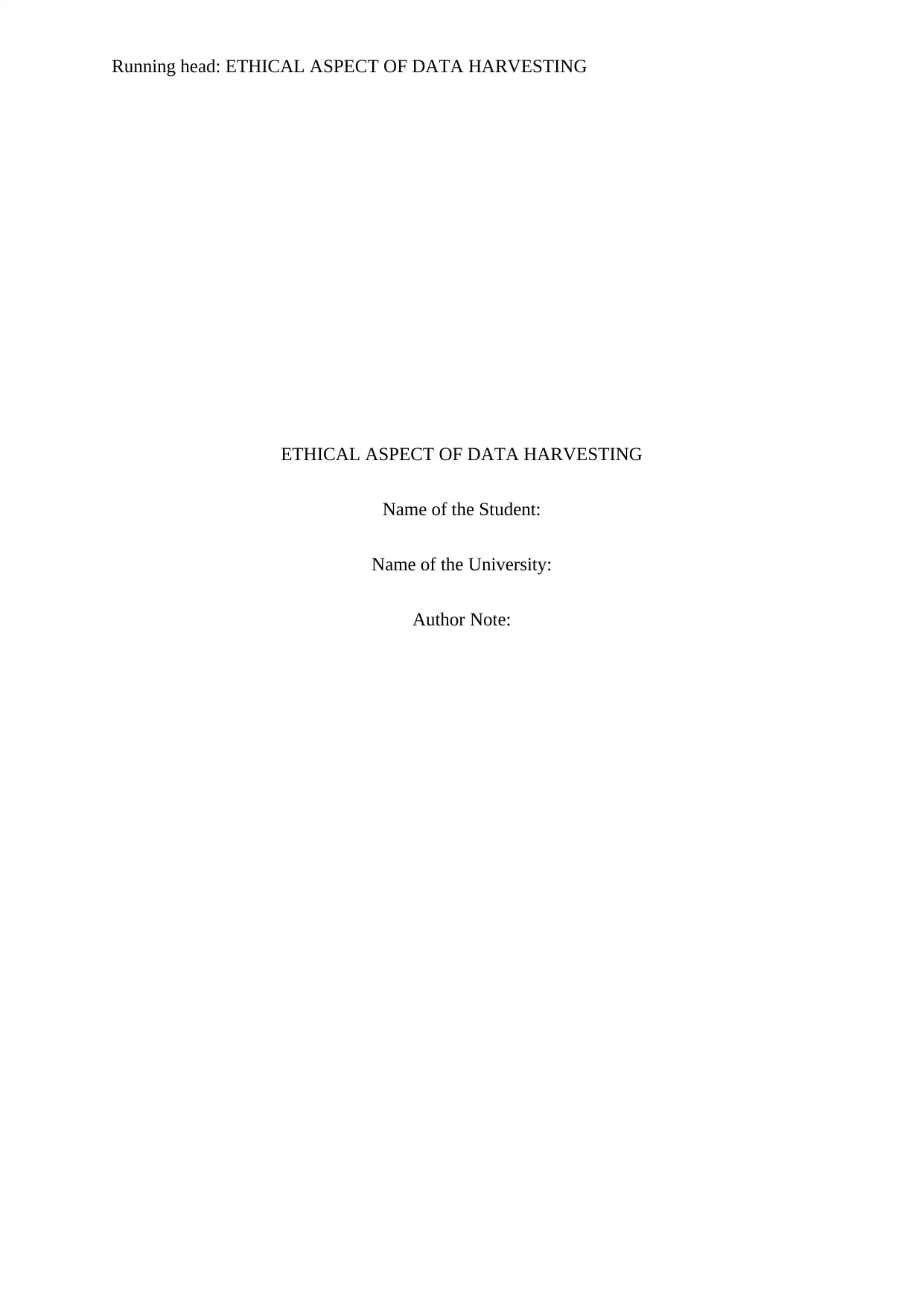
Running head: ETHICAL ASPECT OF DATA HARVESTING
ETHICAL ASPECT OF DATA HARVESTING
Name of the Student:
Name of the University:
Author Note:
ETHICAL ASPECT OF DATA HARVESTING
Name of the Student:
Name of the University:
Author Note:
Paraphrase This Document
Need a fresh take? Get an instant paraphrase of this document with our AI Paraphraser
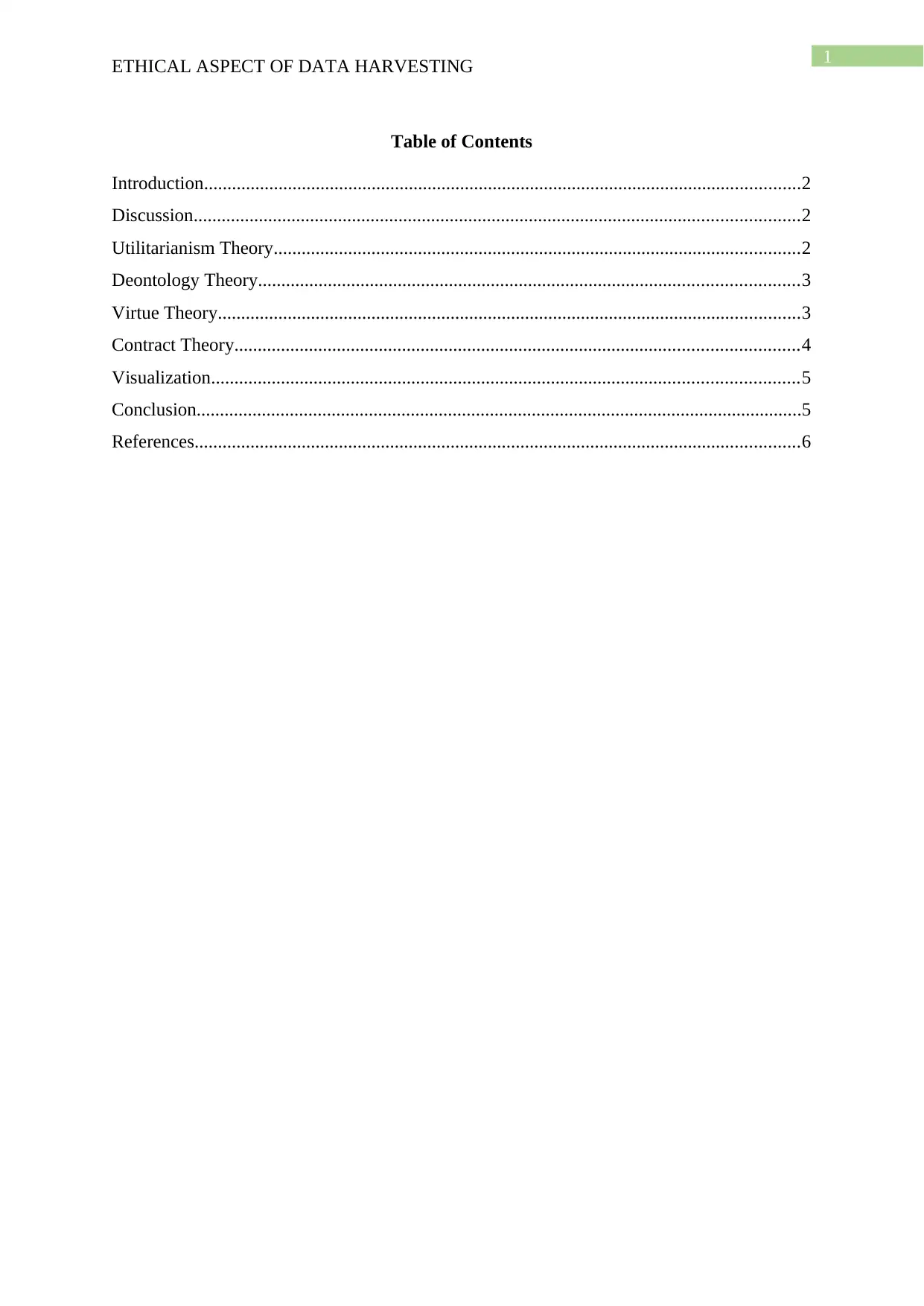
1
ETHICAL ASPECT OF DATA HARVESTING
Table of Contents
Introduction................................................................................................................................2
Discussion..................................................................................................................................2
Utilitarianism Theory.................................................................................................................2
Deontology Theory....................................................................................................................3
Virtue Theory.............................................................................................................................3
Contract Theory.........................................................................................................................4
Visualization..............................................................................................................................5
Conclusion..................................................................................................................................5
References..................................................................................................................................6
ETHICAL ASPECT OF DATA HARVESTING
Table of Contents
Introduction................................................................................................................................2
Discussion..................................................................................................................................2
Utilitarianism Theory.................................................................................................................2
Deontology Theory....................................................................................................................3
Virtue Theory.............................................................................................................................3
Contract Theory.........................................................................................................................4
Visualization..............................................................................................................................5
Conclusion..................................................................................................................................5
References..................................................................................................................................6
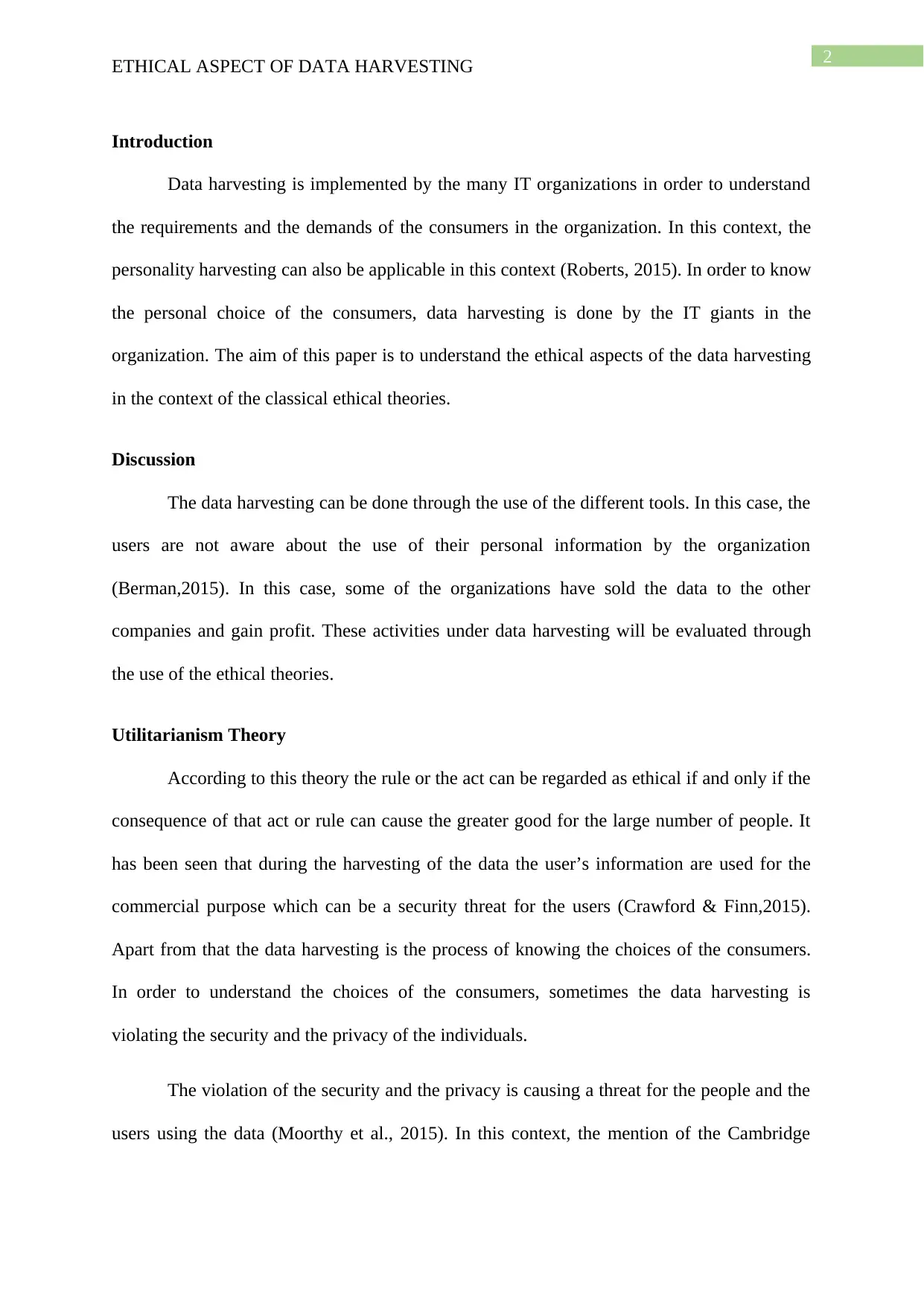
2
ETHICAL ASPECT OF DATA HARVESTING
Introduction
Data harvesting is implemented by the many IT organizations in order to understand
the requirements and the demands of the consumers in the organization. In this context, the
personality harvesting can also be applicable in this context (Roberts, 2015). In order to know
the personal choice of the consumers, data harvesting is done by the IT giants in the
organization. The aim of this paper is to understand the ethical aspects of the data harvesting
in the context of the classical ethical theories.
Discussion
The data harvesting can be done through the use of the different tools. In this case, the
users are not aware about the use of their personal information by the organization
(Berman,2015). In this case, some of the organizations have sold the data to the other
companies and gain profit. These activities under data harvesting will be evaluated through
the use of the ethical theories.
Utilitarianism Theory
According to this theory the rule or the act can be regarded as ethical if and only if the
consequence of that act or rule can cause the greater good for the large number of people. It
has been seen that during the harvesting of the data the user’s information are used for the
commercial purpose which can be a security threat for the users (Crawford & Finn,2015).
Apart from that the data harvesting is the process of knowing the choices of the consumers.
In order to understand the choices of the consumers, sometimes the data harvesting is
violating the security and the privacy of the individuals.
The violation of the security and the privacy is causing a threat for the people and the
users using the data (Moorthy et al., 2015). In this context, the mention of the Cambridge
ETHICAL ASPECT OF DATA HARVESTING
Introduction
Data harvesting is implemented by the many IT organizations in order to understand
the requirements and the demands of the consumers in the organization. In this context, the
personality harvesting can also be applicable in this context (Roberts, 2015). In order to know
the personal choice of the consumers, data harvesting is done by the IT giants in the
organization. The aim of this paper is to understand the ethical aspects of the data harvesting
in the context of the classical ethical theories.
Discussion
The data harvesting can be done through the use of the different tools. In this case, the
users are not aware about the use of their personal information by the organization
(Berman,2015). In this case, some of the organizations have sold the data to the other
companies and gain profit. These activities under data harvesting will be evaluated through
the use of the ethical theories.
Utilitarianism Theory
According to this theory the rule or the act can be regarded as ethical if and only if the
consequence of that act or rule can cause the greater good for the large number of people. It
has been seen that during the harvesting of the data the user’s information are used for the
commercial purpose which can be a security threat for the users (Crawford & Finn,2015).
Apart from that the data harvesting is the process of knowing the choices of the consumers.
In order to understand the choices of the consumers, sometimes the data harvesting is
violating the security and the privacy of the individuals.
The violation of the security and the privacy is causing a threat for the people and the
users using the data (Moorthy et al., 2015). In this context, the mention of the Cambridge
⊘ This is a preview!⊘
Do you want full access?
Subscribe today to unlock all pages.

Trusted by 1+ million students worldwide
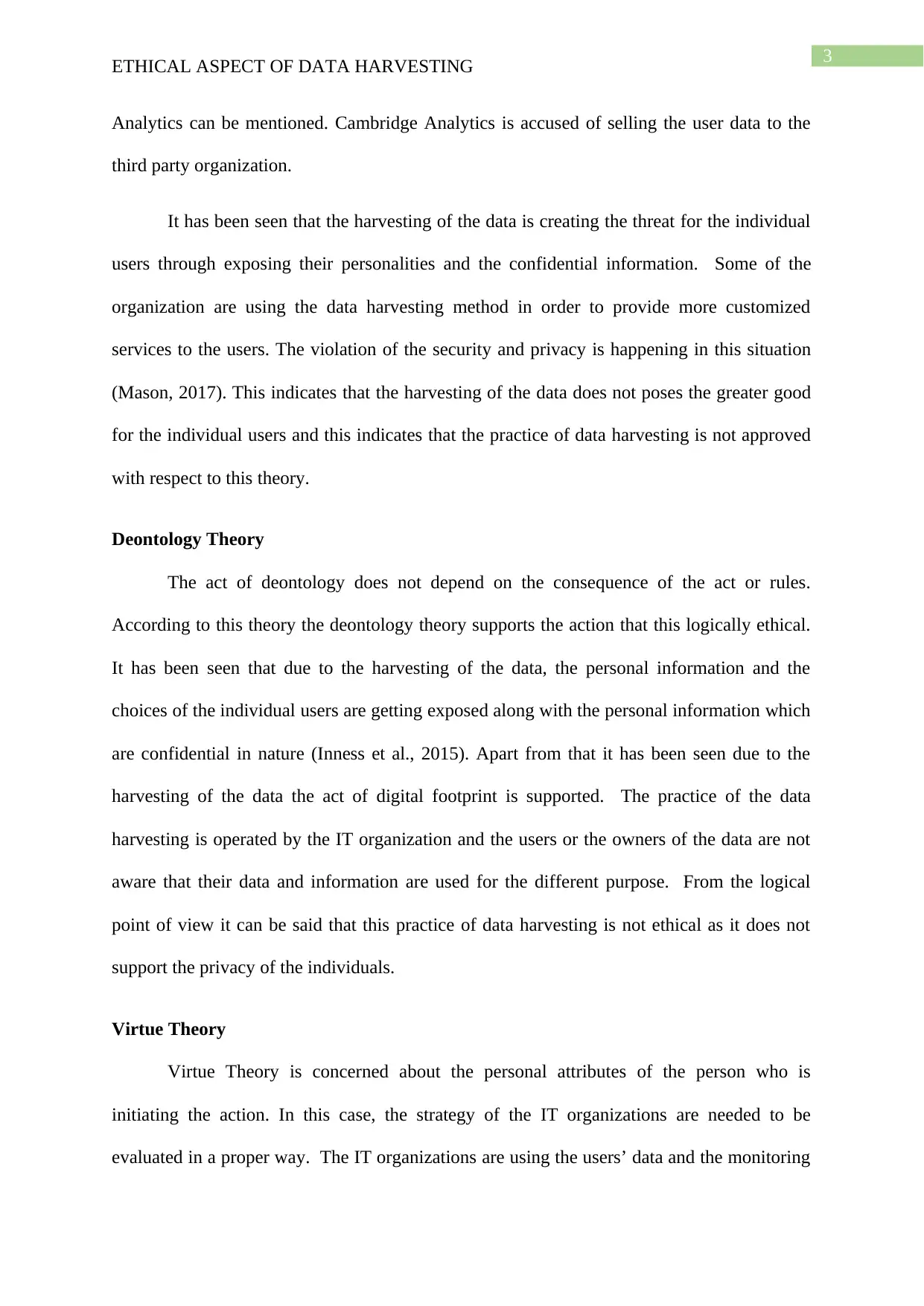
3
ETHICAL ASPECT OF DATA HARVESTING
Analytics can be mentioned. Cambridge Analytics is accused of selling the user data to the
third party organization.
It has been seen that the harvesting of the data is creating the threat for the individual
users through exposing their personalities and the confidential information. Some of the
organization are using the data harvesting method in order to provide more customized
services to the users. The violation of the security and privacy is happening in this situation
(Mason, 2017). This indicates that the harvesting of the data does not poses the greater good
for the individual users and this indicates that the practice of data harvesting is not approved
with respect to this theory.
Deontology Theory
The act of deontology does not depend on the consequence of the act or rules.
According to this theory the deontology theory supports the action that this logically ethical.
It has been seen that due to the harvesting of the data, the personal information and the
choices of the individual users are getting exposed along with the personal information which
are confidential in nature (Inness et al., 2015). Apart from that it has been seen due to the
harvesting of the data the act of digital footprint is supported. The practice of the data
harvesting is operated by the IT organization and the users or the owners of the data are not
aware that their data and information are used for the different purpose. From the logical
point of view it can be said that this practice of data harvesting is not ethical as it does not
support the privacy of the individuals.
Virtue Theory
Virtue Theory is concerned about the personal attributes of the person who is
initiating the action. In this case, the strategy of the IT organizations are needed to be
evaluated in a proper way. The IT organizations are using the users’ data and the monitoring
ETHICAL ASPECT OF DATA HARVESTING
Analytics can be mentioned. Cambridge Analytics is accused of selling the user data to the
third party organization.
It has been seen that the harvesting of the data is creating the threat for the individual
users through exposing their personalities and the confidential information. Some of the
organization are using the data harvesting method in order to provide more customized
services to the users. The violation of the security and privacy is happening in this situation
(Mason, 2017). This indicates that the harvesting of the data does not poses the greater good
for the individual users and this indicates that the practice of data harvesting is not approved
with respect to this theory.
Deontology Theory
The act of deontology does not depend on the consequence of the act or rules.
According to this theory the deontology theory supports the action that this logically ethical.
It has been seen that due to the harvesting of the data, the personal information and the
choices of the individual users are getting exposed along with the personal information which
are confidential in nature (Inness et al., 2015). Apart from that it has been seen due to the
harvesting of the data the act of digital footprint is supported. The practice of the data
harvesting is operated by the IT organization and the users or the owners of the data are not
aware that their data and information are used for the different purpose. From the logical
point of view it can be said that this practice of data harvesting is not ethical as it does not
support the privacy of the individuals.
Virtue Theory
Virtue Theory is concerned about the personal attributes of the person who is
initiating the action. In this case, the strategy of the IT organizations are needed to be
evaluated in a proper way. The IT organizations are using the users’ data and the monitoring
Paraphrase This Document
Need a fresh take? Get an instant paraphrase of this document with our AI Paraphraser
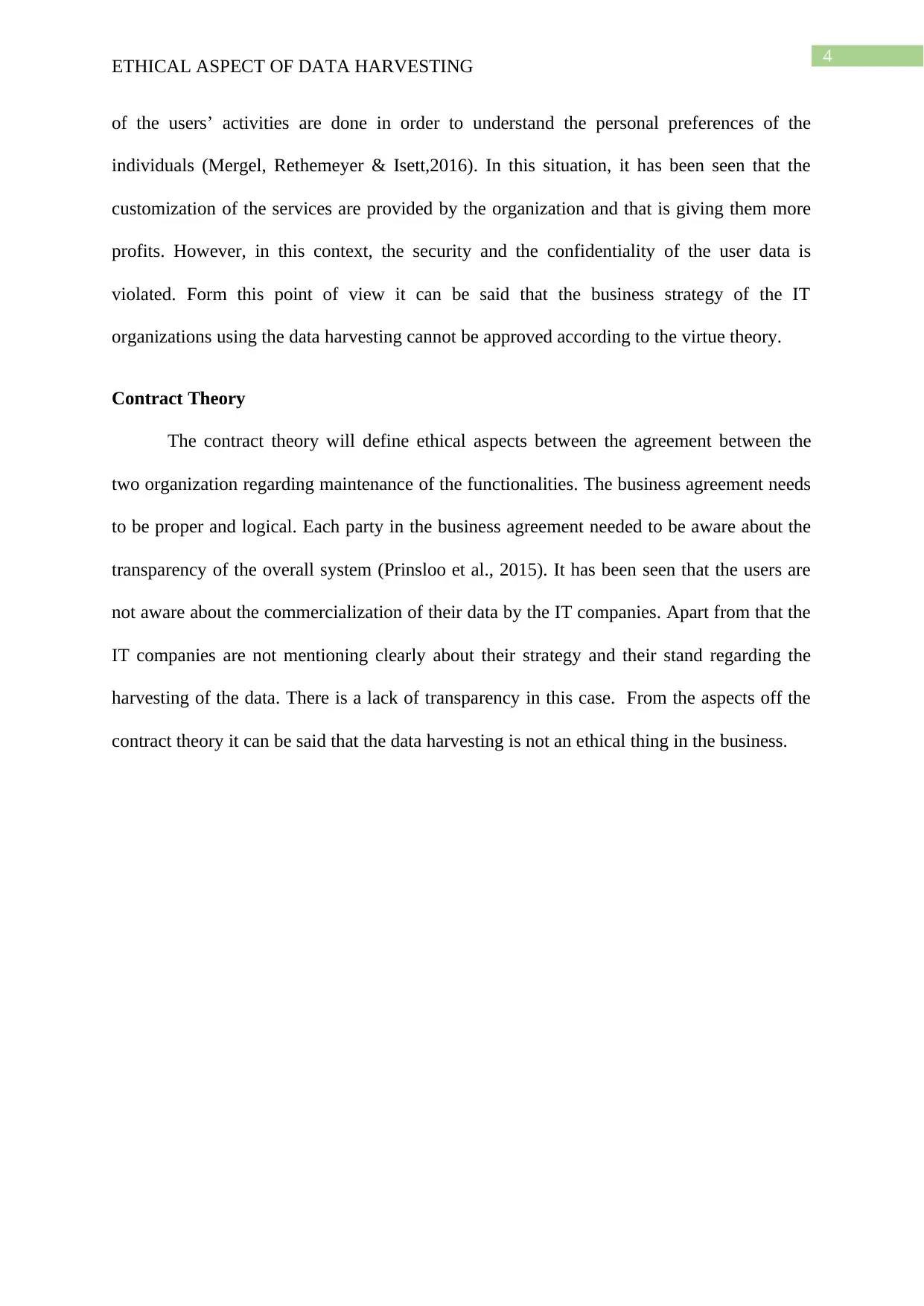
4
ETHICAL ASPECT OF DATA HARVESTING
of the users’ activities are done in order to understand the personal preferences of the
individuals (Mergel, Rethemeyer & Isett,2016). In this situation, it has been seen that the
customization of the services are provided by the organization and that is giving them more
profits. However, in this context, the security and the confidentiality of the user data is
violated. Form this point of view it can be said that the business strategy of the IT
organizations using the data harvesting cannot be approved according to the virtue theory.
Contract Theory
The contract theory will define ethical aspects between the agreement between the
two organization regarding maintenance of the functionalities. The business agreement needs
to be proper and logical. Each party in the business agreement needed to be aware about the
transparency of the overall system (Prinsloo et al., 2015). It has been seen that the users are
not aware about the commercialization of their data by the IT companies. Apart from that the
IT companies are not mentioning clearly about their strategy and their stand regarding the
harvesting of the data. There is a lack of transparency in this case. From the aspects off the
contract theory it can be said that the data harvesting is not an ethical thing in the business.
ETHICAL ASPECT OF DATA HARVESTING
of the users’ activities are done in order to understand the personal preferences of the
individuals (Mergel, Rethemeyer & Isett,2016). In this situation, it has been seen that the
customization of the services are provided by the organization and that is giving them more
profits. However, in this context, the security and the confidentiality of the user data is
violated. Form this point of view it can be said that the business strategy of the IT
organizations using the data harvesting cannot be approved according to the virtue theory.
Contract Theory
The contract theory will define ethical aspects between the agreement between the
two organization regarding maintenance of the functionalities. The business agreement needs
to be proper and logical. Each party in the business agreement needed to be aware about the
transparency of the overall system (Prinsloo et al., 2015). It has been seen that the users are
not aware about the commercialization of their data by the IT companies. Apart from that the
IT companies are not mentioning clearly about their strategy and their stand regarding the
harvesting of the data. There is a lack of transparency in this case. From the aspects off the
contract theory it can be said that the data harvesting is not an ethical thing in the business.
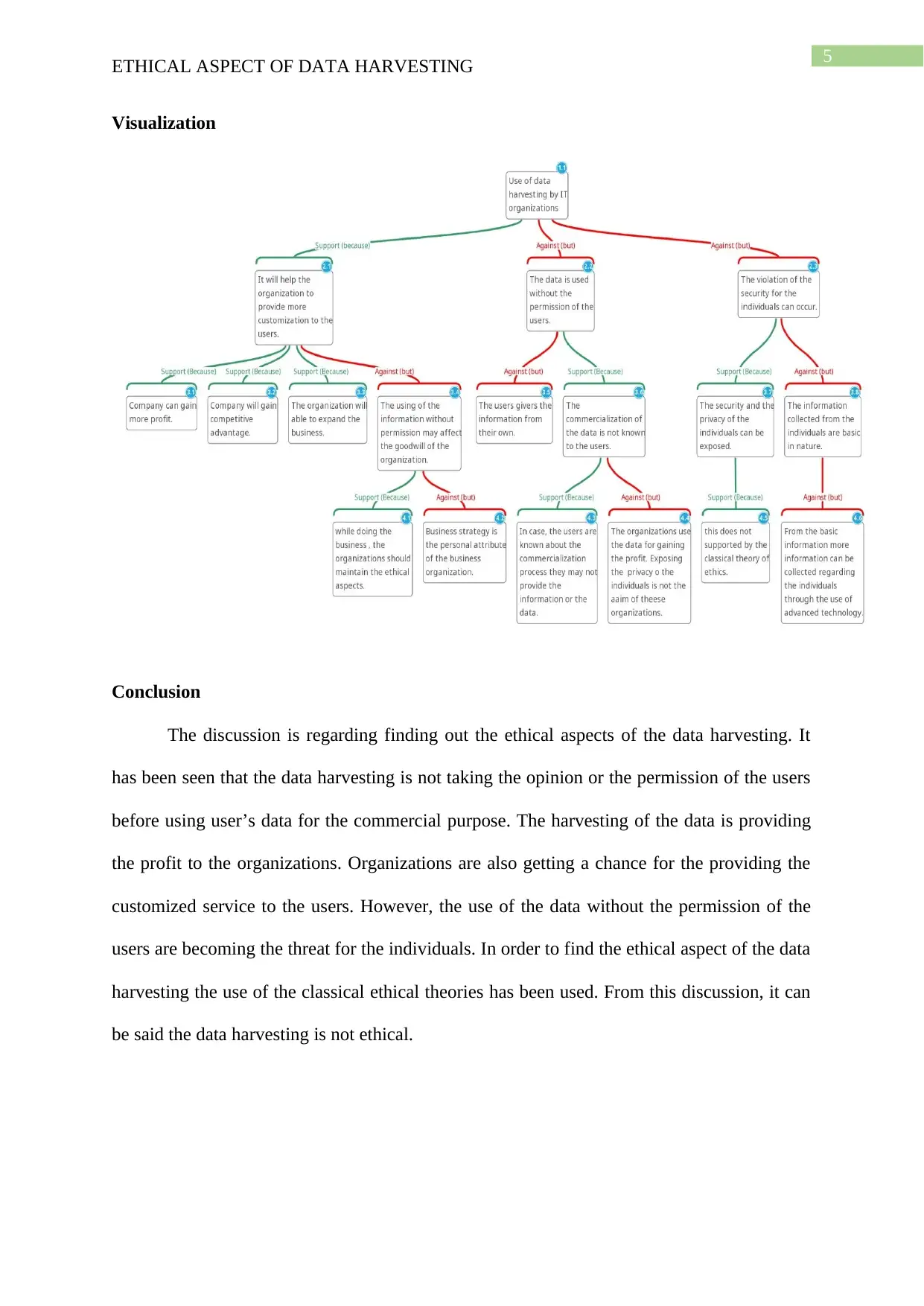
5
ETHICAL ASPECT OF DATA HARVESTING
Visualization
Conclusion
The discussion is regarding finding out the ethical aspects of the data harvesting. It
has been seen that the data harvesting is not taking the opinion or the permission of the users
before using user’s data for the commercial purpose. The harvesting of the data is providing
the profit to the organizations. Organizations are also getting a chance for the providing the
customized service to the users. However, the use of the data without the permission of the
users are becoming the threat for the individuals. In order to find the ethical aspect of the data
harvesting the use of the classical ethical theories has been used. From this discussion, it can
be said the data harvesting is not ethical.
ETHICAL ASPECT OF DATA HARVESTING
Visualization
Conclusion
The discussion is regarding finding out the ethical aspects of the data harvesting. It
has been seen that the data harvesting is not taking the opinion or the permission of the users
before using user’s data for the commercial purpose. The harvesting of the data is providing
the profit to the organizations. Organizations are also getting a chance for the providing the
customized service to the users. However, the use of the data without the permission of the
users are becoming the threat for the individuals. In order to find the ethical aspect of the data
harvesting the use of the classical ethical theories has been used. From this discussion, it can
be said the data harvesting is not ethical.
⊘ This is a preview!⊘
Do you want full access?
Subscribe today to unlock all pages.

Trusted by 1+ million students worldwide
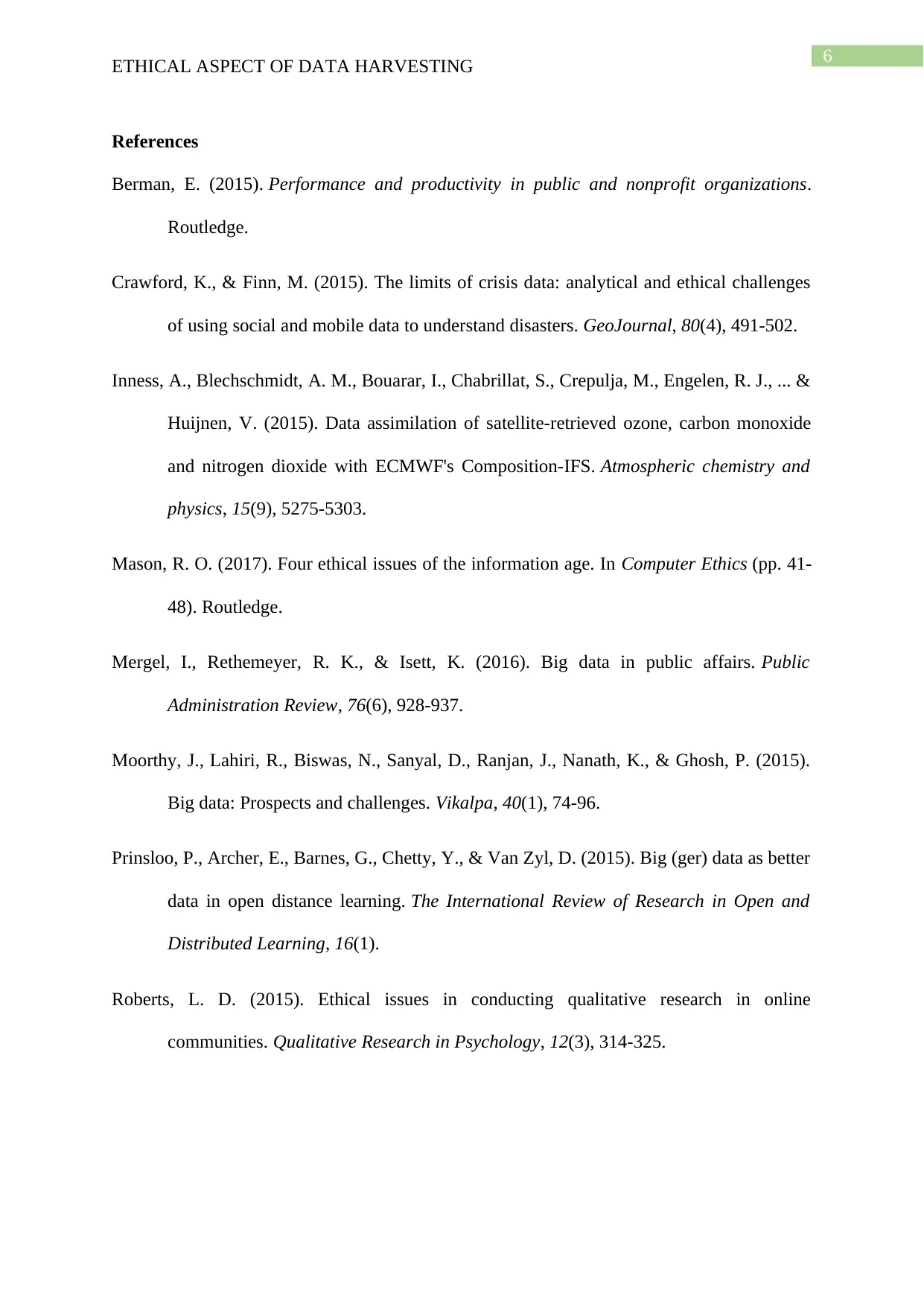
6
ETHICAL ASPECT OF DATA HARVESTING
References
Berman, E. (2015). Performance and productivity in public and nonprofit organizations.
Routledge.
Crawford, K., & Finn, M. (2015). The limits of crisis data: analytical and ethical challenges
of using social and mobile data to understand disasters. GeoJournal, 80(4), 491-502.
Inness, A., Blechschmidt, A. M., Bouarar, I., Chabrillat, S., Crepulja, M., Engelen, R. J., ... &
Huijnen, V. (2015). Data assimilation of satellite-retrieved ozone, carbon monoxide
and nitrogen dioxide with ECMWF's Composition-IFS. Atmospheric chemistry and
physics, 15(9), 5275-5303.
Mason, R. O. (2017). Four ethical issues of the information age. In Computer Ethics (pp. 41-
48). Routledge.
Mergel, I., Rethemeyer, R. K., & Isett, K. (2016). Big data in public affairs. Public
Administration Review, 76(6), 928-937.
Moorthy, J., Lahiri, R., Biswas, N., Sanyal, D., Ranjan, J., Nanath, K., & Ghosh, P. (2015).
Big data: Prospects and challenges. Vikalpa, 40(1), 74-96.
Prinsloo, P., Archer, E., Barnes, G., Chetty, Y., & Van Zyl, D. (2015). Big (ger) data as better
data in open distance learning. The International Review of Research in Open and
Distributed Learning, 16(1).
Roberts, L. D. (2015). Ethical issues in conducting qualitative research in online
communities. Qualitative Research in Psychology, 12(3), 314-325.
ETHICAL ASPECT OF DATA HARVESTING
References
Berman, E. (2015). Performance and productivity in public and nonprofit organizations.
Routledge.
Crawford, K., & Finn, M. (2015). The limits of crisis data: analytical and ethical challenges
of using social and mobile data to understand disasters. GeoJournal, 80(4), 491-502.
Inness, A., Blechschmidt, A. M., Bouarar, I., Chabrillat, S., Crepulja, M., Engelen, R. J., ... &
Huijnen, V. (2015). Data assimilation of satellite-retrieved ozone, carbon monoxide
and nitrogen dioxide with ECMWF's Composition-IFS. Atmospheric chemistry and
physics, 15(9), 5275-5303.
Mason, R. O. (2017). Four ethical issues of the information age. In Computer Ethics (pp. 41-
48). Routledge.
Mergel, I., Rethemeyer, R. K., & Isett, K. (2016). Big data in public affairs. Public
Administration Review, 76(6), 928-937.
Moorthy, J., Lahiri, R., Biswas, N., Sanyal, D., Ranjan, J., Nanath, K., & Ghosh, P. (2015).
Big data: Prospects and challenges. Vikalpa, 40(1), 74-96.
Prinsloo, P., Archer, E., Barnes, G., Chetty, Y., & Van Zyl, D. (2015). Big (ger) data as better
data in open distance learning. The International Review of Research in Open and
Distributed Learning, 16(1).
Roberts, L. D. (2015). Ethical issues in conducting qualitative research in online
communities. Qualitative Research in Psychology, 12(3), 314-325.
1 out of 7
Related Documents
Your All-in-One AI-Powered Toolkit for Academic Success.
+13062052269
info@desklib.com
Available 24*7 on WhatsApp / Email
![[object Object]](/_next/static/media/star-bottom.7253800d.svg)
Unlock your academic potential
Copyright © 2020–2026 A2Z Services. All Rights Reserved. Developed and managed by ZUCOL.




